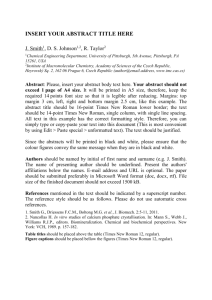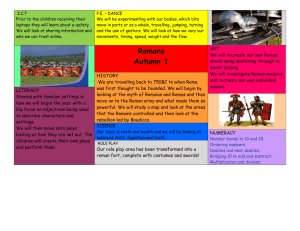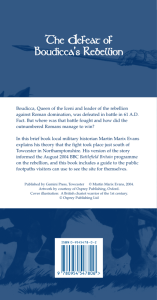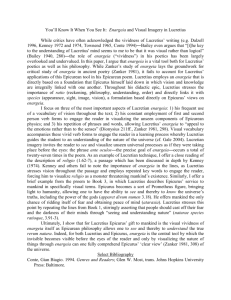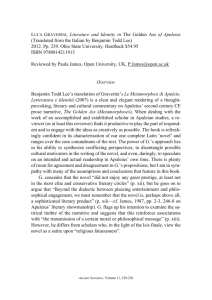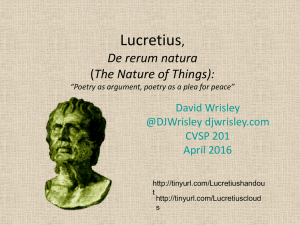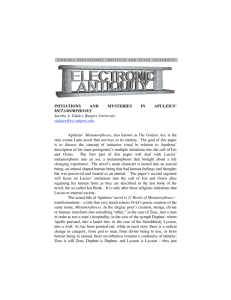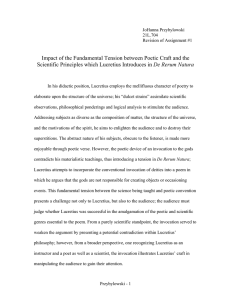Authors
advertisement
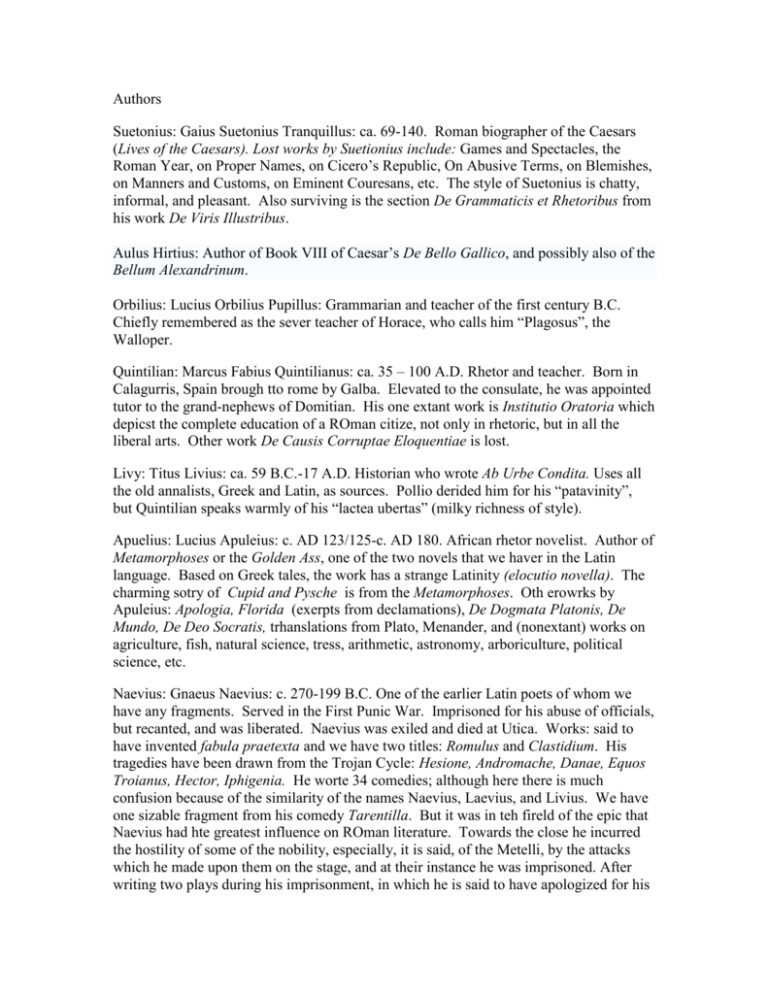
Authors Suetonius: Gaius Suetonius Tranquillus: ca. 69-140. Roman biographer of the Caesars (Lives of the Caesars). Lost works by Suetionius include: Games and Spectacles, the Roman Year, on Proper Names, on Cicero’s Republic, On Abusive Terms, on Blemishes, on Manners and Customs, on Eminent Couresans, etc. The style of Suetonius is chatty, informal, and pleasant. Also surviving is the section De Grammaticis et Rhetoribus from his work De Viris Illustribus. Aulus Hirtius: Author of Book VIII of Caesar’s De Bello Gallico, and possibly also of the Bellum Alexandrinum. Orbilius: Lucius Orbilius Pupillus: Grammarian and teacher of the first century B.C. Chiefly remembered as the sever teacher of Horace, who calls him “Plagosus”, the Walloper. Quintilian: Marcus Fabius Quintilianus: ca. 35 – 100 A.D. Rhetor and teacher. Born in Calagurris, Spain brough tto rome by Galba. Elevated to the consulate, he was appointed tutor to the grand-nephews of Domitian. His one extant work is Institutio Oratoria which depicst the complete education of a ROman citize, not only in rhetoric, but in all the liberal arts. Other work De Causis Corruptae Eloquentiae is lost. Livy: Titus Livius: ca. 59 B.C.-17 A.D. Historian who wrote Ab Urbe Condita. Uses all the old annalists, Greek and Latin, as sources. Pollio derided him for his “patavinity”, but Quintilian speaks warmly of his “lactea ubertas” (milky richness of style). Apuelius: Lucius Apuleius: c. AD 123/125-c. AD 180. African rhetor novelist. Author of Metamorphoses or the Golden Ass, one of the two novels that we haver in the Latin language. Based on Greek tales, the work has a strange Latinity (elocutio novella). The charming sotry of Cupid and Pysche is from the Metamorphoses. Oth erowrks by Apuleius: Apologia, Florida (exerpts from declamations), De Dogmata Platonis, De Mundo, De Deo Socratis, trhanslations from Plato, Menander, and (nonextant) works on agriculture, fish, natural science, tress, arithmetic, astronomy, arboriculture, political science, etc. Naevius: Gnaeus Naevius: c. 270-199 B.C. One of the earlier Latin poets of whom we have any fragments. Served in the First Punic War. Imprisoned for his abuse of officials, but recanted, and was liberated. Naevius was exiled and died at Utica. Works: said to have invented fabula praetexta and we have two titles: Romulus and Clastidium. His tragedies have been drawn from the Trojan Cycle: Hesione, Andromache, Danae, Equos Troianus, Hector, Iphigenia. He worte 34 comedies; although here there is much confusion because of the similarity of the names Naevius, Laevius, and Livius. We have one sizable fragment from his comedy Tarentilla. But it was in teh fireld of the epic that Naevius had hte greatest influence on ROman literature. Towards the close he incurred the hostility of some of the nobility, especially, it is said, of the Metelli, by the attacks which he made upon them on the stage, and at their instance he was imprisoned. After writing two plays during his imprisonment, in which he is said to have apologized for his former rudeness (Gellius iii.3.15), he was liberated through the interference of the tribunes of the commons; but he had shortly afterwards to retire from Rome (in or about 204) to Utica. It may have been during his exile, when withdrawn from his active career as a dramatist, that he composed or completed his poem on the First Punic War. His Bellum Punicum is the first Roman epic that we know of. Naevius may have introduced the Didio episode into the Aeneas legend, but this is not certain. His epitaph, quoted by Gellius, says: “If immortals may weep for mortals, the Muses weep for the poet Naevius; after his death, they forgot how to speak Latin at Rome.” Lucretius: Titus Lucretius Carus: c. 99-55 B.C. Great epic poet of Nature and Epicureanism. Writer of De Rerum Natura. Almost nothing is known of his life. Jerome tells the story of his madness and suicide (due to a love potion). Cicero is said to have eded the De Rerum Natura. Lucretius was the first of the notorious Memmius, to whom he addressed his work, the chief purpose of which was to free mankind from the fear of death which arise from ignorance and superstition. This he does by expounding the atomist theory of hte Epicureans in verse. He mentions the difficulty of dealing wiht a subject so new that he has to invent many words. The poem is full of little hymns in praise of Epicurus. The poem was lost for 1000 years and rediscovered by Poggio in the Renaissance. Columella: Lucius Junius Moderatus Columella: Author of De Re Rustica, a handbook of agriculture. A Spaniard from Gades. Also wrote on trees and against fortune-tellers. De Re Rustica is didactic rather than artistic, but has a fine feeling for the land of Italy. It is full of interesting and useful information. It contains a powerful indictment against absentee landlords as one reason for the decline of Italian agriculture. Cato the Censor: Marcus Porcius Cato: 234-149 BC. Prototype of the frugal, stern and stoical roman of the Republic. Father of Roman prose. Staunchly opposed to the influence of Hellenism. Important for history, oratory, and technical subjects. Works include the Origines (non-extant), historical work; oratory. He published 150 speeches, and we have fragments of 80 (technical). He wrote an encyclopedia for his son, which dealt with jurisprudence, agriculture, military science, rhetoric, and medicine. The treatise on agriculture (De Agri Cultura) is the ONLY work which survives in bulk

